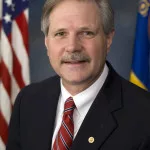
(ND Ag Connection) – By Scout Nelson
The Energy & Environmental Research Center (EERC) at the University of North Dakota (UND) will receive a $5 million grant from the U.S. Department of Energy (DOE) thanks to the efforts of Senator John Hoeven.
With the help of this funding, carbon dioxide (CO2) storage facilities in the Williston Basin will be developed, strengthening North Dakota’s standing as a pioneer in carbon capture, utilization, and storage (CCUS) technology worldwide.
The funding, obtained through the Regional Carbon Sequestration Partnership (RCSP) program, is part of Hoeven’s ongoing efforts to bolster North Dakota’s energy sector. The award builds on previous efforts, including a $5 million grant Hoeven secured for the Plains CO2 Reduction (PCOR) Partnership in 2021.
As a member of the Senate Energy and Water Development Appropriations Committee, Hoeven played a pivotal role in increasing RCSP funding and ensuring that North Dakota remains at the forefront of CCUS development.
Hoeven also included a provision in the annual funding legislation that directed the DOE to issue a competitive, multi-year RCSP solicitation. This initiative supports partnerships like PCOR in advancing CCUS projects in key regions, including the Bakken.
Senator Hoeven emphasized the significance of this award, stating, “Whether in support of our coal-fired power plants, facilities like the Great Plains Synfuels Plant, or our vast oil and gas industry, EERC and North Dakota are leading the way in developing CCUS technologies. This $5 million award provides continued support for the partnerships we’ve built to advance these efforts.”
The grant will enable EERC to leverage its technical expertise and collaborate with companies to establish basin-wide carbon storage facilities. This initiative takes advantage of the unique geology of the Bakken region and the regulatory framework that Hoeven helped establish, ensuring the success of CCUS projects at both the state and federal levels.
Through Hoeven’s leadership, North Dakota became the first state to achieve regulatory primacy over Class VI wells for geologic CO2 storage, a critical step in advancing the state’s CCUS capabilities. This award represents another significant milestone in the state’s ongoing efforts to enhance its energy infrastructure and environmental sustainability.
